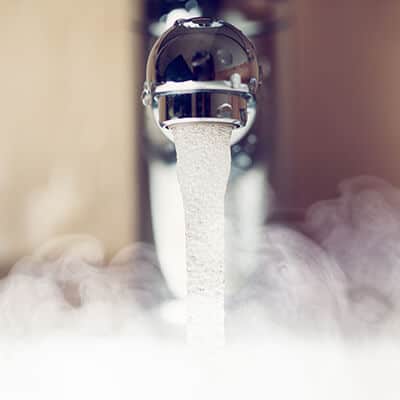What Type Of Water Heater Is Most Energy Efficient?

Regardless of your lifestyle, a water heater remains an essential component of your daily routine. While shopping for a water heater, the top feature you should consider is its efficiency. The last thing you need is an appliance that will drive your energy costs through the roof.
Luckily, you can buy an energy-efficient water heater that will significantly reduce your heating costs while keeping the environment clean. All you need is a little knowledge of the types of energy-efficient water heaters and how they compare. Each of these appliances has its strengths and weakness, but which one is more efficient? Here is a guide to help you choose.
Standard Water Heaters
Also known as conventional water heaters, these appliances are popular among homeowners. Standard water heaters come with a large insulated tank that warms and stores water. Unlike other heaters, standard water heaters have lower up-front costs.
Unless you go for the high-end conventional types, you will typically spend less to purchase this kind of water heater than you would spend on other kinds. They can hold between 20 and 80 gallons of hot water and are equipped with relief valves in case of too much pressure.
This type of water heater works by allowing cold water to enter the tank through the inlet pipes before it is heated by electricity or gas, depending on your home setup. The heated water will remain hot at a specified temperature until a need arises.
In terms of efficiency, standard water heaters remain functional regardless of the weather or your location. If it remains properly maintained, you will receive a seamless supply of hot water for your home for a long time.
Standard water heaters are easy to install, but they are often associated with significant heat loss. Heat escapes through the pipes, and this leads to energy wastage even when the heater isn’t running. But on the brighter side, these tanks come with insulation that prevents the loss.
They are a good option if you need an affordable and easy way to have a continuous supply of hot water in your home and if space isn’t a limitation for you.
Tankless Water Heaters
Tankless water heaters are also known as “demand heaters” because of their instantaneous function. They don’t have any storage containers. When you turn on the tap, cold water flows through super-heated coils with a specific temperature setting before being delivered to the required designation.
Tankless water heaters deliver an endless supply of hot water for you and your family for as long as it is needed. Of course, there are large and small units personalized to meet the needs of your household.
These units are way more efficient than the conventional water heaters that lose some heat during the process. With a tankless model, no heat loss or water wastage occurs since water is only heated when needed. All the water in the coils is also used up, minimizing wastage.
Apart from effectively lowering your month-to-month energy costs and maintaining a constant temperature, these appliances also save on space. The coils negate the need for a continuous water reservoir. They can be mounted on walls or on the roof.
Perhaps the only drawbacks include the limited flow rate of water, which is about 3.5 gallons a minute. This makes it more suitable for smaller households. Also, the initial cost can be higher.
Heat Pump Water Heaters
These types of units are also known as hybrid water heaters. They use heat from the ambient air to heat your water. They are perhaps the most efficient water heaters on the market today.
Heat pump water heaters utilize up to 60% less energy compared to a conventional water heater. Their installation, however, requires a space of approximately seven inches from the floor and the ceiling. This is the standard requirement for a heat pump water heater to pump since the pump is on top.
Similarly, the heater needs a warm space of up to 1,000 cubic feet for it to optimally capture heat from the surroundings. This way, the supplemental electrical heating can better stack up against periods of high demand.
Heat pump water heaters tend to cost more than tankless models; however, their energy-saving capability makes the initial investment worth it. They also require less maintenance and are only inspected once a year by a professional.
On the downside, heat pump water heaters can last for about 10 years – standard water heaters last longer than hybrid heaters. They also demand a lot in terms of space and are ideal for regions with temperatures that fall between 40 and 90 degrees year-round.
Solar Water Heaters
As indicated by the name, solar water heaters use power from the sun to heat water. They are equipped with a collector containing tubes or water pipes. As the sun’s heat warms the pipes, the pipes then circulate the cold water in closed coils connecting to the reservoir.
The collector is a flat box that is usually installed on your roof. Once the water has been collected, it flows back to the storage unit. When the temperatures outside are low, the unit, through thermostatic controls, prevents the water from flowing out through the tubes.
Typically, a solar water heat often incorporates a supplemental heat source for a steady supply of warm water.
Solar water heaters are the most energy-efficient units available on the market today. They can be used everywhere, provided there is direct sunlight that can be harnessed. They are also cost-friendly, eco-friendly and they incur lower utility bills.
Better yet, there is usually a tax credit eligibility, thanks to the government’s incentivization of solar panels. The only quibbles include the cost of installation and sunshine reliability. You must be in a place that receives plenty of sunshine.
Condensing Water Heaters
If your home uses a gas furnace or heating system, then a condensing water heater will be the most appropriate option. The condensing water heaters are like the standard storage water heaters except that their source of heat is from the hot exhaust gases that would otherwise escape your household through flues.
The heat is redirected to a heat exchanger contained in the water reservoir. At the bottom of the unit is a coil that gases travel through as cold water in the tank absorbs its heat. As the tank fills up with water, it is heated up almost as rapidly, promising you a near-endless supply of hot water.
Condensing water heaters allow you to save energy costs by up to 30%. This, however, is only achievable if your home has an efficient heating system. The units are easy to run, but they cost a lot more than conventional tanks.
They are also large, handling 55 gallons of water and more. This makes it unsuitable for small spaces but ideal for large families.
Contact Us
Whether you’re looking to upgrade or install a new water heater in your home, you can always enlist the help of Brennan Heating & Air Conditioning in King, Snohomish, Pierce, Lewis, Thurston, Mason and Kitsap counties in the Puget Sound area. We will work with you to ensure that your home is efficient while saving you money. We also offer an array of home improvement products, including furnaces, air conditioners, heat pumps, hydronic heating systems, indoor air quality products, gas water heaters, tankless water heaters and more. Contact Brennan Heating & Air Conditioning today for any heating, cooling or electric services!






